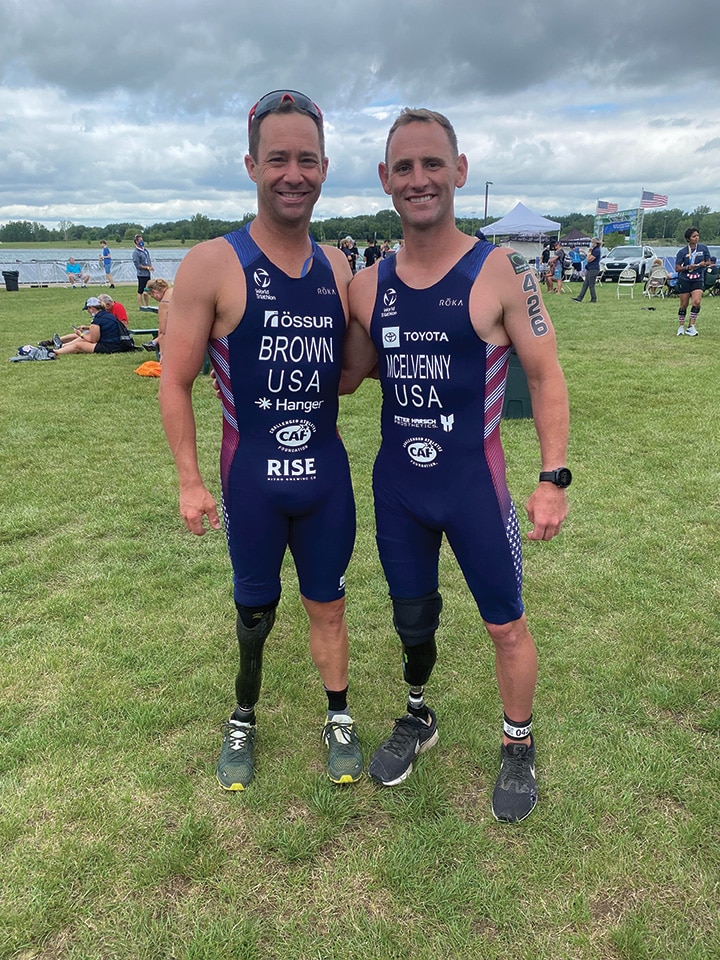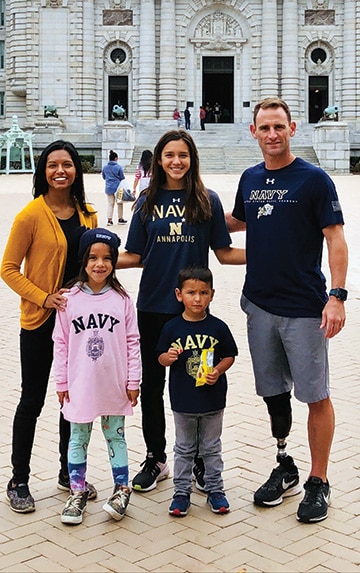 By Laura Canfield
By Laura Canfield
Eric McElvenny served as a member of the U.S. Marine Corps for seven years after graduating from the U.S. Naval Academy. In 2011, during his final deployment in Afghanistan, he was wounded during combat operations and underwent a below‑knee amputation.
During the early days of his recovery at the Balboa Naval Medical Center, he felt uncertain of what the future held in store. “A week or two after my injury, I was lying in the hospital bed, and felt this fear of the unknown,” he says. “I wondered what would happen.”
As if right on cue, Marine Corps Captain Max Frank paid Eric a visit. He told Eric he too was a new amputee and had learned to run just six months after his limb loss. “And then,” Eric recalls, “he took off his leg and challenged me: Let’s see if you can do it sooner than me.”
Over dinner with Eric and his wife, Captain Frank explained about life after amputation, alleviating Eric’s fears. “I had been trying to find a new normal and had lots of uncertainties. That dinner took away a lot of the unknown,” Eric says.
A week or two after my injury, I was lying in the hospital bed, and felt this fear of the unknown. I wondered what would happen.
Eric realized he needed to reach out to others with limb loss, to learn from them and to become part of a community of people that actively supported one another. He became involved with the Challenged Athletes Foundation’s Operation Rebound, which supports other‑abled veterans and first responders.
After a lifetime of playing sports, including as a member of the Naval Academy’s Rugby Team, Eric wanted to stay physically active after limb loss. He attended a CAF‑co‑sponsored Mobility Clinic, where he learned how to refine his gait technique and use a sports prosthesis to run again. He then set a goal of trying an IRONMAN Triathlon, which consists of a 2.4-mile swim, a 112-mile bike ride, and a 26.2-mile run. He completed his first sprint distance triathlon eight months after his injury, and continued racing until he finished the IRONMAN World Championships just 22 months after his limb loss.
In 2019, accomplished paratriathlete Jamie Brown reached out to Eric, encouraging him to try qualifying for Team USA’s Paralympic team.
“I compete in the same category as Jamie, and yet he encouraged me to race against him,” Eric says. “It’s a healthy competition, we made each other better. If I had done better than him, I could have taken his spot on the team. But Jamie said, ‘No problem. Let’s both qualify!’.”
Training together, both ultimately qualified for Team USA and competed in Paratriathlon in Tokyo in 2021.
Jamie’s example continues to shape Eric’s life today, as he continues training in hopes of qualifying for the Paris Paralympics.
Part of my job is to compete to the best of my ability,. But I also want to pull others into the mix and encourage them so that as a country, we can all compete and do well.
“Part of my job is to compete to the best of my ability,” he says. “But I also want to pull others into the mix and encourage them so that as a country, we can all compete and do well.”
Eric is currently ranked #3 in Paratriathlon in the world, recently setting a personal best record and earning a bronze medal at the World Series Triathlon event in Whales, UK. To date, he has completed eight IRONMAN Triathlons, including the IRONMAN World Championship in Kona, Hawaii. And he attributes his success to the community he’s joined since losing his leg.
 “When I think back, there was a time when I didn’t know what my next step was going to be, and it was scary. Then I met other amputees, and it became a community. The fear of the unknown left me,” he says. “I think being part of a community with other amputees, however that happens, is so beneficial. We have to figure a lot of things out when we lose a limb, and it’s easier to learn from others. Anytime I have a question, I reach out to my community, and I ask them what their experience has been.”
“When I think back, there was a time when I didn’t know what my next step was going to be, and it was scary. Then I met other amputees, and it became a community. The fear of the unknown left me,” he says. “I think being part of a community with other amputees, however that happens, is so beneficial. We have to figure a lot of things out when we lose a limb, and it’s easier to learn from others. Anytime I have a question, I reach out to my community, and I ask them what their experience has been.”
And Eric’s continuing to give back to his community, as well. His limb loss journey, starting as a participant at a free Mobility Clinic, has come full circle. After attending a few Clinics, he was asked to become a Mobility Clinic mentor, helping other attendees. And in 2022, he became an official member of the Clinic faculty.
“I love crossing finish lines but being able to step up and coach others is so much cooler,” Eric says. “It’s so rewarding to be part of someone
else’s journey.”

